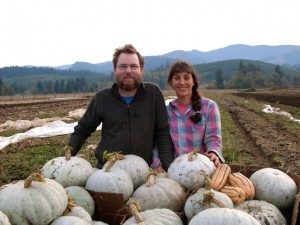
Adaptive Seeds
Andrew Still and Sarah Kleeger
Sweet Home, Oregon
In 2006, Andrew Still and Sarah Kleeger set out on a four-month journey spanning Northern and Eastern Europe. They dubbed this trip the “Seed Ambassadors Project,” where the objective of each stop was to connect with seed stewards and collect both seed and stories. Their travels took them to nine countries.
“The people we met on our journey inspired me,” says Sarah. “They were stewarding open-pollinated seed not only in a market of increasing hybrids, but doing this work in the face of highly restrictive European seed laws that often lock farmer-bred varieties out.”
After returning from their trip, Andrew and Sarah established Adaptive Seeds, a regional seed company based in Sweet Home, Oregon.
“We saw how different factors contributed to the erosion of agricultural biodiversity and the decline in quality, OP seed,” Andrew says. “And we realized that this was a problem that we could do something about.”
Today, Adaptive Seeds conducts on-farm breeding projects and commercial seed production. In 2012, Andrew and Sarah saved seed from 225 varieties of garden vegetables, herbs, flowers, grains, and dry beans. Of those seed crops, about 80 percent of these varieties are available for sale through their catalogue. Another 10 percent is available through Seed Savers Exchange — “conservation projects,” they call them, because there isn’t enough supply to offer them commercially. The remaining 10 percent make up their own breeding projects or are saved for seed increases for future commercial seed crops.
Sarah says Adaptive Seeds is growing at a rate that is hard to keep up with, even as other small, regional seed companies pop up in response to the negative impacts of seed industry consolidation and demand for improved OP varieties.
Andrew and Sarah see these trends as an opportunity to move forward new models and solutions to incentivize innovation, especially on the farm.
“We need to focus on capacity building within the community of seed stewards,” says Andrew. “We need to look into innovation incentives and open-source frameworks for sharing our work, which is mostly prior art and should never be patented, but it should be incentivized.”
“We also need a bit of a value shift in the market,” Andrew adds. “There is no incentive for seed companies and farmers to work on developing and improving OPs because people think they should be cheap. Once more people appreciate quality OPs, and will pay a higher price for them, there will be more people working with them, and diversity and quality will go up.”
Andrew is hopeful that universities will play a bigger role in expanding seed diversity and quality as well. He sees renewed interest in organic plant breeding within the land grant university system, and points to Dr. Jim Myers at Oregon State University, less than an hour from Adaptive Seeds, and his work to develop OP vegetables for organic systems.
Oregon State University is one of several schools engaged in participatory plant breeding projects with Organic Seed Alliance. These projects are resulting in much-needed organic variety trial data to assist organic growers with their seed decisions. These partnerships also provide field days and seed workshops to farmers like Andrew and Sarah. They say more opportunities like these are needed, where seed growers build and share skills to support their work.
Adaptive Seeds faces challenges much like any seed business, from capacity issues to protecting the genetic integrity of their seed from genetically engineered (GE) crops. Still, Sarah says working with seed is the most important thing she could be doing with her time. Andrew agrees: “I would characterize our work with seed as the most powerful way to create the world we want, from the bottom up.”
Their advice to new seed growers is to first learn how to farm, read lots of books, and figure out what scale works best for your growing purposes, including your market. Try growing a seed crop and see how you like it, they say, starting with your favorite OP variety just in case it disappears next season. “And go to OSA seed seminars!” Andrew says.
“We haven’t yet reached a critical mass of farmers engaging in seed work,” Sarah says. “I think once we get more people engaged in seed, we will begin to see broader improvements in crop genetics.”
As they work to expand genetic diversity on their farm, it’s clear that Adaptive Seeds wants their customers to join them in this mission. A description of their business illustrates well their commitment to not just growing good seed, but growing a strong seed stewardship movement:
We are here to provide you with excellent quality seed for your food production needs and part of that goal is to provide you with the quality foundation material for your own locally adapted seed saving and stewardship needs, wherever your field or garden happens to be. We want everyone to be seed savers. But if you cannot save seed in your garden or on your farm, we would love to be your seed stewards.
This post is part of our Farmer Seed Stewardship initiative series. The initiative is a partnership between OSA and Seed Matters, and promotes farmers engagement in seed systems – training farmers in seed production and crop improvement, and advocating for farmers’ ability to save, improve, and plant the seed they need.
